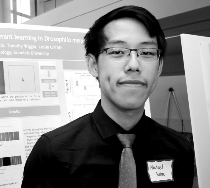Michael Hsiao
 Griffith Laboratory
Griffith Laboratory
Department of Biology
Brandeis University
Sleep is Essential for Appetitive Operant Learning in Drosophila Melanogaster
Poster Abstract
Learning from experience takes place in our everyday lives. In classical conditioning, a neutral stimulus is paired with a reward or punishment, whereas in operant conditioning, a behavior is paired with a reward or punishment. Mutation of genes necessary for neuronal function is capable of disrupting both classical and operant learning. However, the neuronal basis for operant learning is still not yet known, even in simple model organisms like flies. Our approach is to use a Y-shaped maze to train flies to preferentially choose either the left or right arm of the maze when passing through the choice point by rewarding them with sugar each time they choose correctly. Our goal is to get a better understanding of how flies learn, as well as investigate connections between sleep and learning. We found that wild type (CS) flies that sleep early on in training learn significantly better than flies that don’t sleep. Furthermore, we found that wild type flies show a low preference index immediately before a sleep episode and a high preference index after a sleep episode, whereas this did not occur in mutant (dunce) flies known to be deficient in learning. With rising prevalence in mental illnesses such as anxiety disorders, where maladaptive operant learning such as avoidance and escape further worsens the condition, being able to identify the neurons responsible for operant learning could prove to be important.
Personal Statement
Having had the fortune to work in the Griffith Lab for over a year now, I was able to continue with my research over the summer with the help of the Bauer Foundation. Given the preliminary data that we had collected over the semester, our primary goal was to maximize data throughput. What I did in the first couple of weeks was nothing like what I had imagined I would to be doing in the laboratory environment, but nonetheless exciting and worthwhile. We spent days outside in the sun, building boxes in which our apparatus ended up residing. Perhaps not as pleasant of an experience as it sounds, it taught me more than I could ever ask for from a normal laboratory experience, with real life skills that I know I will end up using later on in life. Furthermore, it also fulfilled parts of my former aspiration to become an engineer, even though I have chosen to pursue a different career path. With what we have discovered about learning and sleep in flies, I hope to continue with the project over the semester and more than likely turning it into a thesis project.